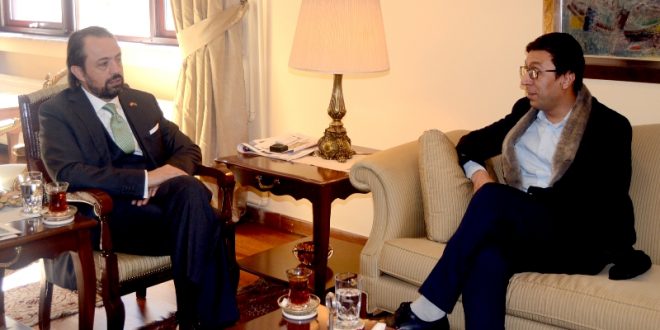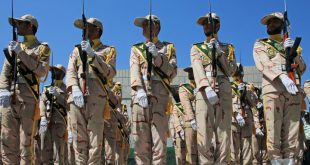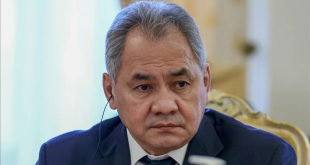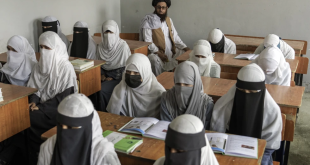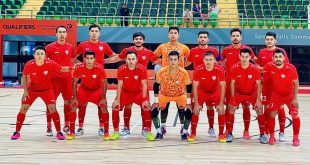
An exclusive interview with Turkish Ambassador in Afghanistan, Oguzhan Ertuğrul
– Peace process should be all inclusive, and based on genuine power-sharing
– Turkey is ready to host one round of talks between Afghan and Taliban sides
– Turkey always calling for a ceasefire – talking and fighting should not be an option
– The biggest challenge is political disunity among the Afghan elites
– Afghans should not lose hope, if so, they will lose dignity, and sovereignty
By Mansoor Faizy
Afghanistan has been in a whirl of unending war and continuous turmoil that peace, or at least a state of normalcy, is a distant dream. The Afghans are in war for over four decades, and this is more than enough. The reconciliation process is once again in deadlock, highlighting the complexity of the peace process, manacling the political elite and complicating the future of Afghanistan.
Even the U.S.-centric peace process is yet to bear any results, whereas war has been intensified across Afghanistan, and the new trend of targeted-killings including journalists, started after US-Taliban peace deal. With such an uncertainty, the neighbors are now seeking broader prescreens by offering help in the theater of peace quest, and the Taliban quit the table of talks instead visited some capitals. This scenario has raised many questions as to where Afghanistan might be possibly heading.
To explore these questions, we have interviewed Turkish Ambassador in Afghanistan, Oguzhan Ertuğrul. He assured his country’s long-lasting support to Afghan peace process, calling on the Afghan masses not to lose “hope”, if so, they will lose “dignity” and “sovereignty”. He also saw political disunity among Afghan elites as the biggest challenge. He said that the political leaders should act wisely with common sense as statesmen.
There may be differences of opinions and ideology for the future of Afghanistan, but there is now a historic opportunity that should not be missed, Mr. Ertugrul said, referring to the peace talks between Afghan and Taliban negotiating teams. He said the road to peace is bumpy, but the Afghans should keep determination, and commitment to peace. “We as Turkey, as the long-lasting brother and true friend of Afghanistan, we will continue to stay side by you as long as our support is needed,” he added.
During the interview, the ambassador struck us as a fervent to see a peaceful and stable Afghanistan. Despite enjoying immense brotherhood relationships, Afghanistan and Turkey will celebrate the 100th anniversary of bilateral diplomatic relationships. Afghanistan was the second nation to recognize the Republic of Turkey after Soviet Union on March 1, 1921.
What is Turkey expected to do at the moment to help Afghanistan during the peace talks?
Peace is the desire of all Afghan nations as well as the Turkey, and the most of the international community. Afghanistan has suffered for the last four decades, and I think it’s enough. Peace is long overdue where there is huge longing, everyone is missing peace and those short ceasefire during the Eids last year and the year before that, the people were so happy. People tested peace for a few days at least. Now for peace to come, you need national consensus, regional consensus, and then international consensus. National consensus is almost there. In my opinion, no one can challenge peace here in Afghanistan in the national front, where there is more works need to be done in the regional and in international affairs to generate international support because it’s most reasonable and achievable.
Everyone says the peace should come, the peace is coming, but the peace is coming from where. The violence is so high. The people and even the international community started making question whether it makes sense to continue the peace talks while the violence continues at this level. It’s a challenge now whether it makes senses. I think the Republic side is doing everything it can to continue the talks. The fact is that the Republic Negotiating Team is still in Doha, it is a testimony to them, and I mean they are just waiting for the talks. They went there on the 5th of January; maybe they talked once or twice than now the Taliban are visiting some capitals. But the Republic Negotiating Team is staying there. This is in my opinion, is the display of commitment, determination on peace on the part of the Republic, which I commend and admire.
For peace, yes you can bring peace, but the ultimate objective should not be to bring any peace. The objective should be to bring sustainable and long-lasting peace, of course, at the same time a dignified peace. For this to happen, there are two critical components, first is for peace to come should meet the concerns and expectations of all segment of the Afghan society. In other words, peace should be all-inclusive. For that to happen, the process or the mechanisms that are established here in Kabul for the peace process be it in the High Council for National Reconciliation (HCNR), at the Ministry of Foreign Affairs, in the Palace, the Territorial, I mean they should get onboard all the voices in Afghanistan. I am not talking only about the ethnicities, but also women, media, youths, NGOs, and civil society, the parliament as well – that’s how you can make the peace all inclusive. There are some concerns at the moment from some of these circles that they are a bit sidelined in the process that they are not well-represented there in the Doha in the peace team and here in the HCRN. I think, there is still a bit of homework require here to generate that national consensus in an all inclusive manners. There are no doubt all of them like all of us seeking peace, but you should get onboard their voices. That is a dilemma, or challenge let’s say, but I believe, the political leaders here in Kabul can overcome this challenge and that’s why we as Turkey, see the full operationalization of HCRN very critical – the High Council for National Reconciliation that established by the political agreement signed between the two leaders – it took long time, last year it held its first meeting of their leadership committee. And they now there are organizational structures are composed of 13 committees, now they started functioning, which is a good sign. One of the committee is the regional and international affairs commission, which regularly updates and started to brief the international community, which is a good sign. That was a concern on the international community that the council was setup and why it doesn’t’ function for the last coup of months. And now there are other committees as well – media committee took place, NGO and women committee took place, which is a very good sign. Other committees should also start functioning. Where coordination among these committee will be done appropriately, and the term come soon where the broader general committee assembly of the council, and they will do all good responsibility in terms of bringing all those voices onboard. That’s why the composition of that general assembly will be a critical – from the media side you should be there – from women, NGOs, from all the ethnicities and some other minorities, as it mentioned in the Afghan Constitution, and some other ethnicities – they should all have a voice. I think it would be a huge general assembly but it’s required – so this is the homework.
In other words, to make the long story short, peace should be all inclusive, and should be able to meet all the expectations and concerns of the segments of the Afghan society. That peace should be based on genuine power-sharing and comprehensive national compact or conciliation. This is the first prerequisite. The second requirement for the peace to be long-lasting, in my opinion is related to the regional and international aspect. In order for a peace to be a sustainable, it has to have regional support. In the absence of regional support, you can still bring peace, but I am afraid it could collapse in a couple of years. So we, the international community together with the Republic leaders, we should start initiating regional engagement, or a regional diplomacy. With the view of starting regional process, in parallel to the peace process, in my opinion, the peace process, let’s say to be concluded with political roadmap, but for this regional process, it should also concluded in sort of a joint communicate or a text, in which the participants of these regional process will recommit themselves to the security, stability, and development of Afghanistan. But this regional process, will be as long, bumpy, complex, and complicated as much as the peace process itself. So for the moment, this regional link is missing in the peace efforts. That’s not there yet whereas there is proliferation of initiatives to initiate this regional process. There is this six plus two from the UN, and then the international contact group and then Moscow Format, then Shanghai Afghanistan group, but we as Turkey believe that we don’t need reinvented, there is already a process at hand that brings together all the stakeholders and that is Heart of Asia Istanbul Process that Afghanistan and Turkey co-initiated in 2011. Yes the process itself is a bit too large but I believe the process again is flexible in itself to device new working methods to bring together the critical stakeholders and then as time goes by in the regional process and the members of the other process can be taken onboard. So this is the two prerequisite that I see that should be met. Now where Turkey stands on all this – we as Turkey has a very longstanding relationship and brotherhood with Afghanistan, we have a very good wide network of partnerships and alliances in this region and in the west. I think we as Turkey can bring our contribution on both process – in the peace process – from very highest political level, we have been saying for the last two years that Turkey is ready to support the peace process, including hosting one round of the talks. So that offer is there. Whereas for the regional track, I think we, as a Turkey with that wide network friendship and partnerships, we can play a critical role in initiating and making progress in the regional process. Taking also into account that Turkey has also very good relations with Afghanistan neighbor, with Pakistan, so have trilateral process, Afghanistan, Turkey, Pakistan, and we are working on some other ideas that we can bring our contributions in other trilateral formats with some other regional countries. So our offer is there, we are ready and willing and we will do our utmost in all sides be it the Taliban or Republic side agree on some roles that Turkey can play and needless to say we are ready to take that responsibility. The political will is there and in my opinion it’s a historic responsibility from our side to bring or to do our utmost in bringing a lasting peace here in Afghanistan.
What is your assessment regarding the Taliban. Will their recent trips to foreign countries help them in the peace process?
There is a pause for the moment in the second round of peace talks. It seems all the sides are waiting for the result or outcome of the review by the Joe Biden’s administration. In the mean time they took these regional trips, and frank speaking, I am not aware of what kind of messages they have given or what kind of messages they have received from these host nations. I believe, any settlement here in Afghanistan has I said, it have to all inclusive and will have to include the Taliban side because Taliban are also a reality of Afghanistan, it goes without saying. I think the international and the regional community can display unified position and giving similar messages that we would all like to see in Afghanistan democratic, secure, stable, economic sustainable, self-sufficient, at peace with itself and with its neighbors and with the regional and large, and that has the capacity not to allow some terrorist groups to pose a threat to the outside, or the international community. As I said a democratic Afghanistan and needless to say that the international community, there is also consensus that none of us would like to lose the achievements of the last two decades. So, that’s why it will be critical for the success of the peace and these two processes should progress in coordination with each other. The two processes should be mutually complimentary, and the international community should be able to give unified messages to all sides to the Republic sides and the Taliban as well in this framework. For the last two decades, there is military presence here, NATO’s presence for the last five years continued in noncombat format, which we called trained, advice and assist. Of course I cannot prejudge the outcome of the decisions of my political masters in Brussels that the defense ministers would come together in mid-February and then foreign ministers will come together, then it would be decided what to do. I think they will also take into account the current status of the talks the current status of the security environment here in Afghanistan and let’s wait and see what kind of decision they will take. In any case, NATO, I think will, that’s my personnel opinion that make consider checking whether conditions are right to leave. But let’s wait and see.
Taliban insists on the formation of their self-style government and also to resume attacking US troops if they did not leave the country by May. This is while the US administration reviewing the deal and likely may not leave. As a veteran diplomat I would like to ask you what will happen if the talk fails.
The agreement between the US and the Taliban puts some obligations on both sides; I think that’s what is under review on the moment. The two sides should make a reality check and see where they stand in terms of their own obligations and responsibilities. And depending on the conclusions of this review, of course there maybe some negotiations between themselves again for the next steps and if the review ends up with postponement of the deadly, I don’t know how long, the reasons for the postponement should be explained in details in well to all sides to the Republic side and to Taliban as well that why there is such a delay. If the conditions are not meet, than during that delay or postponement, both sides should do their utmost to take their responsibility, and coordination among NATO members will also be again very much important, which are US friends and partners. So NATO and the US will act in tandem. But we must make sure as the international community that the peace process is not suspended and that the peace process should continue, whereas the violence should be reduced and if possible ceasefire should be agreed.
Do you see any certain elements worsening the situation besides the Taliban, like other groups, because now we see a new wave of targeted-killings, including the journalists, doctors, judges, civil society workers and…?
I have no information who conducts those attacks. So you have to revert to the government and the Taliban side on this issue. But one thing is for sure that such attacks are not helping the peace process, it damaging the trust-building efforts between the two sides that will be critical for the success of the peace process that two sides should start trusting each other slowly, slowly. Again, these attacks do not help in that sense.
But why these attacks are taking place on such a particular time – do you see any relation or link with the peace talks?
Terrorism is always been a tool to scare the people, that is a tool that is used unfortunately. And the timing of these attacks, since I don’t have information I can’t confirm that this group conducts or that group conducts. So I am not in an informed position to make a judgment on this.
But it’s worrying the Turkey?
Yes, of course, from every opportunity we are calling for a ceasefire and in all our remarks in the international forum, we have been calling for a comprehensive ceasefire. Talking and fighting, at the same time, should not be an option anymore. So once you set and start the peace process, you should whether reduce violence or declare a ceasefire that’s what we believe, even my minister at the inauguration session of the peace process on September 12th, he made the same plea for a ceasefire. So I can’t make judgment on that.
Is it important to have an interim-government, and will it help the peace process?
This is an issue where the two sides should negotiate and decide on the table. If the two sides agree that, some more steps have to be taken in order the process move forward, in order ceasefire to be declared. If they decided on those steps, I think the whole international community will respect but it will reflect the joint or collective decision and wisdom of the two sides. So the international community only respect to the will of the two negotiating sides. It’s up to them to decide what those steps would be. Afghans know better than me and the rest of the international community, what is good for your own country – what is good for the future of Afghanistan, nobody should impose – no outsider should impose its own system, or agenda, or priority to two sides on the table. The future of Afghanistan should be shaped and decided by the freewill of the two sides. This peace process as we all know, would be very long and bumpy at some points throughout the process, there may be sometimes when the two sides cannot agree, and you maybe need the facilitation, mediation of a thirty party, than you can call him, or more than one inside the room, other than that the principle is that two sides agreed that they don’t need any mediation or facilitator inside the room. But when the second round resumes and the agenda is agreed, because it will also takes time, the agenda will be very critical, in my opinion it might take longer than in the first round, and then the substantive talks will start. When that happens, at some points depending on the topics, you may need facilitation of some third countries or in my opinion sometimes from Ulema from some Muslim countries where the two sides agreed to call. The two sides may also need advice and guidance from some prominent Ulema.

Do you see any pressure tool from Turkey side on Pakistan to at least bring back the Taliban to the table of talks because Pakistan Prime Minister Imran Khan already took all the leverage of the talks?
Indeed, I don’t defined it as pressure, we have continue dialogue with our Pakistani friends and brothers that’s why with this understanding that we want to revitalize the trilateral among the Turkey, Afghanistan and Pakistan, and we are working on it. We will take some concrete steps soon to bring together the three countries be in Turkey, or in Kabul maybe in Islamabad, it’s still under discussion, but that trilateral will do a critical job in bridging confidence gap between the two neighbors, in rising awareness about each other concerns and expectations. Turkey is more than happy to see that there are some concrete bilateral steps between Islamabad and Kabul. His Excellency Prime Minister Imran Khan visited Kabul, and some decisions were taken and I hope progress made soon, so some concrete other steps could be taken to build on common understanding. The regional and the international community should recognize that the security and stability of Afghanistan is on the best interest not only to you, but to us as well. Afghanistan is named or called Heart of Asia for a reason. Really Afghanistan is like the Heart of the Asia and if the Heart has a problem than the whole region as a problem, that’s what we keep in our minds as your Turkish brothers.
Is US Peace Envoy Zalmay Khalilzad is fit for the mission?
I am not in a position to judge him, but I can say that he is doing his best. He has undertaking the herculean tasks, because it’s not easy, and we appreciate his work and Turkey supports him and he visited Turkey twice. He is coordinating with the elite capitals and in Brussels as well, so it’s easy to critics, but please put yourself in his shoes and just remember how many times he visited to those regions, the countries and in Doha how many days he spent. And we, the NATO allies, and the regional partners should join hands to support that initiative. The fact that two sides – the republic side and the Taliban side, have come together around the negotiating table is a historic success in itself, and a historic opportunity, and this opportunity should not be missed. That is the message we are giving as Turkey to all sides.
No one can undermine the role of Iran in the peace process, because the Taliban delegation, lead by Mullah Baradar, just recently visited the country. Moreover, U.S. has no good relation with Iran at the moment. Will fall out between Washington and Tehran affect the peace process?
Of course it has potential to have some sorts of impact on the peace process in Afghanistan. As I said earlier, the security and stability of Afghanistan is to the best interests of all of us. If Afghanistan is sick we will also be affected. So all of us should recognize that Afghanistan has suffered more than enough for the four decades, peace is long overdue. Now it’s the time to join our hands to bring a sustainable and dignified peace. And all inclusive peace based on the regional support and wider national reconciliation, widest social compact. For this to happen, not only Iran, but other neighbors, closer neighbors, wider neighbors and the critical international stakeholders should join hands. It’s with this understanding that Turkey strongly believes that Heart of Asia is the right format. All the other initiatives that have referred to in one way or another, have their missing link, but the Heart of Asia bringing together this all stakeholders that I am referring to. And we should make full use of this process.
Turkey is hosting refugees from countries in war, including Afghanistan. We have reports about their forcefully expulsion. Is that right, since Afghan refugees consider Turkey a safe place to live despite many of them lack legal documents?
Thank you for raising this issue. The irregular migration, as we call it, is not a threat and should not be proceed as a threat to the national security of our nations. It’s with unfortunate to see this perception in some western countries, which we don’t see it in Turkey. That’s why we are hosting almost 3.5 million Syrian, where you add other migrants, Afghans or other countries from Middle East and Africa. To total number reaches 4.5 million migrants in Turkey. At the moment, Turkey is the country that hosts the most migrants in the world; there is no any other country that hosts such numbers. This is reflections of our humanitarian diplomacy, and we cannot turn a blind eye to them, or deaf ears to their concerns. In recent years the irregular flow of Afghans to Turkey is increased, I mean in 2019, last year in 2020 it decreased again due to Covid-19 pandemic. In 2019 it was more than 100 thousands. We have some centers that we gather the irregular migrants and since we also host the Syrians and some other migrants that they might gather in those centers, we sent them back to their own native countries, but we do it based on their will. It is not a forced repatriation. There are some issues between the Afghan government and us about the modalities of this repatriation, which we continue to consult and coordinate. But, those centers are also has a limited capacity from time to time, we have expedite the process and we had to have repatriate them in large numbers some times because there are some other migrants that are waiting in line. But we want to do in coordinate fashion with our Afghan side. The cooperation still continues on the modality of repatriation, and we also paying attention to support some portion of our development aid to those who are repatriated here. But you also have to recognize the burden that the Turkey is shouldering in this issue not only to Afghans. So far during the last eight years, the expenditure we have made in this area is 35 billion US Dollars. So it’s not an easy issue for us. I wish that we could have found better ways for our Afghan brothers in Afghanistan, but we are doing our best in Turkey. You also recognize the fact that as long as these conflicts in the world, social and economic injustices continue, the irregular migrations would continue. Do you think that irregular migrations would finish when peace comes immediately, because when peace comes the social and economic under development of Afghanistan will continue for sometimes, it will take times, even decades. So in my opinion, even if a peace comes, the irregular flow will not stop, but this conflict and social economic injustices when combined, it doubles the flow outsides. We don’t see Afghans as foreigners in Turkey. We consider you as one of us, but we also have order and legislation that we have to follow and that’s what Turkish authorities are doing in a dignified way. From time to time there maybe differences of opinions in this issue, but since we have very strong bonds between the two nations, I think we overcome – this is a critical with a strong humanitarian aspect the Turkey not only in Afghanistan but in the region and the wider international forum, is advocating for a humanitarian diplomacy that world globally has failed in this issue. Its only Turkish authorities rescuing a lot of migrants be it in the agency, borders or so on. Our partners in the international community should do more to take their share of burdens that is missing for the moment.
What is your message to the Afghan masses in this crucial time?
My message from my heart is that you (Afghans) should not lose your hope, if you lose your hope you can lose your country, your sovereignty, your dignity. I know it’s not easy to lose hope after four decades of conflict, but if you lose your hope than you lose your everything. Yes I know Afghanistan is facing many complex challenges – the corruption is a big problem, the drug production and trade is a big problem, security is the biggest problem, unemployment and…,but the biggest challenge is none of them. As far as I see, the biggest challenge is political disunity among the political elites. Thank God I don’t see this disunity among the men in the street – it’s among the elites. Now is the time to come together and joint hands for the political leaders. The need for political unity and solidarity is much more than ever. The political leaders of the country should act as statesmen wisdom and with common sense. There might have been differences of opinions in the past; all of you don’t have to have the same vision or ideology for the future of Afghanistan, but there is now a historic opportunity that should not be missed. Now the leaders bear a huge responsibility and in that sense we see a huge responsibility falls on the HCNR, because it’s the utmost highest body in charge of peace process and it should be the one to generate this unity. It’s easy to say, I know, but it’s difficult to do. But if you lose your hope, as I said, than you don’t need to engage in all these efforts. This political unity and solidarity will be the key. I will not argue that it will be easy to achieve then you unite, but it will be easier to tackle all these challenges. For the moment you make life for yourself much more difficult with this political wrestling. But I am hopeful a dignified, sustainable, and all inclusive peace could come, if political unity is achieved and regional and international support is generated. When combined all together, we can all, the Afghans, the international community, of course the Taliban, also consider them as part of you, then we can bring a long-lasting and sustainable peace. Yes it will not be easy, it will be long process. The road to peace is bumpy, but you have to keep your determination, and commitment to peace. We as Turkey, as my last message to you is that we as the long-lasting brother and true friend of Afghanistan, we will continue to stay side by you as long as our support is needed. You can rest assured of that.
Thank you very much Sir.
You’re most welcome.
Mansoor Faizy, is the Editor-in-Chief of Afghanistan Times Daily, and could be reached at [email protected]
 Afghanistan Times
Afghanistan Times
